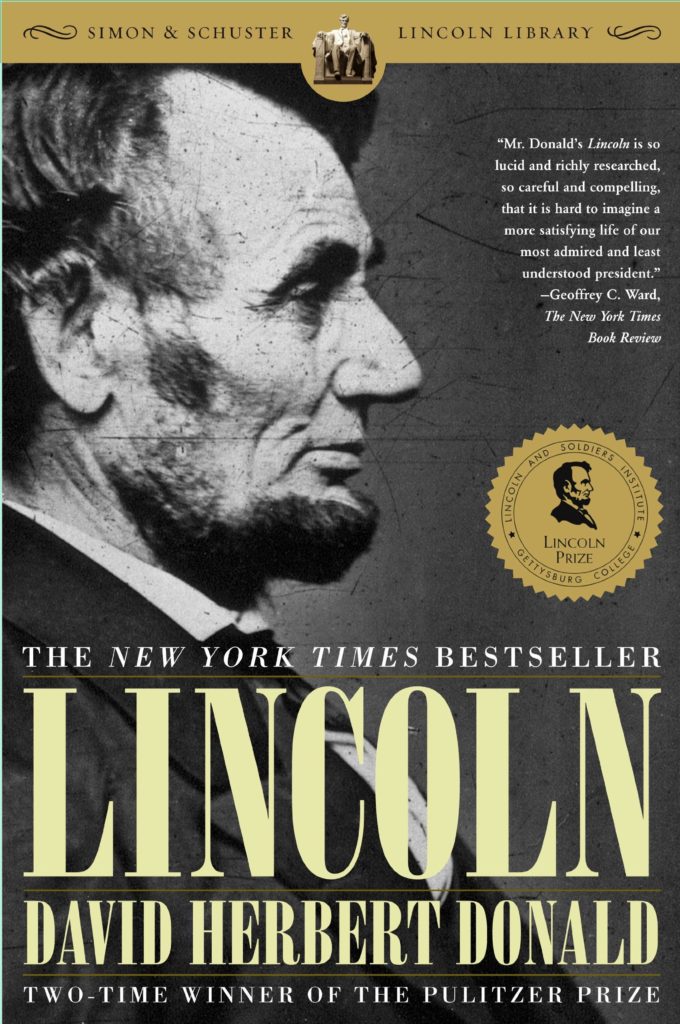“We are not, as a race, so much disposed to fight and kill one another as our red brethren.”
Abraham Lincoln, commenting on Native Americans to a group visiting the White House…..during the Civil War.
More books have been written about Abraham Lincoln than any other person in history, save the Lord Jesus Christ himself. David Herbert Donald must feel pretty good that his simply titled work, Lincoln, is arguably the best cradle to the grave biography of the 16th US President. Personally, I think it’s worth all the hype it receives and readily heap more praise atop the book myself.
There is a lot at stake discussing the life of Lincoln. The Myth and the Man at times overlap, but they are surely not one in the same. Donald does not shy away from the more nuanced and complex pieces of Lincoln’s story and he provides ample context for the reader to take in the information and come away with their own judgments. Two initial impressions jarred my personal understanding of Honest Abe.
First, he was much more of a true politician than I realized. He knew how to make backroom deals. He knew when and where to delegate, often using surrogates to get things done. He could glad-hand people with the best office seekers of the day. He seems to have always been genuine and maintained his integrity, but he knew how to play the game. Holding early jobs like postmaster, surveyor and circuit lawyer, Lincoln got to know everybody. These friendly relationships would make his early campaigns a breeze.
Second, I gained a far greater (and much more nuanced) understanding of Lincoln’s personal stance on race relations. Despite penning the Emancipation Proclamation and ushering through the 13th Amendment, he was by no means an abolitionist. Abe was primarily a separatist, favoring voluntary colonization. He thought there was no way blacks and whites could live together in peace after the atrocity of slavery. Initially, he even had his own doubts about black intelligence in general. Naturally, that prejudice was erased as he met and worked with more people of color, especially Frederick Douglass.
Lincoln had little firsthand experience with slavery before he arrived in Washington other than the relatively genteel settings of his wife’s and best friend’s plantations in Kentucky. He was long a proponent of remunerative emancipation to compensate the states directly for economic interruptions the removal of slavery would inevitably cause. As early as 1837 he declared “that the institution of slavery is founded on both injustice and bad policy.” However, the lawyer in him felt, “the Congress of the United States has no power, under the constitution, to interfere with the institution of slavery in the different States.” He, like Jefferson before, honestly thought slavery would naturally die out if kept confined. He thought without expansion of it, it would become unprofitable and fold.
This is the point where the foibles of Fillmore, Pierce and Buchanan would come to bear. Removal of the Missouri Compromise line, passage of the Kansas-Nebraska Act and the Dred Scott verdict shook Lincoln to his core and drove him into the ranks of the fledgling, openly anti-slavery Republican Party. The Scott case in particular broke his deferential faith in the Supreme Court, to the point where he thought the Chief Justice was doing “obvious violence to the plain unmistakable language of the Declaration [of Independence]” because he felt it was clear that “all men” included black ones.
During his presidency, the Great Emancipator chipped away rather than struck at slavery with a single stroke. He signed a law prohibiting slavery in the Territories, pointedly ignoring the Dred Scott decision. Lincoln also welcomed a treaty with Britain to make suppression of the Atlantic slave trade more effective and refused to commute a death penalty sentence for the first American slaver convicted and hanged for trafficking human bondage. These steps were modest to be sure, but it was a hell of a lot more than anyone else had done for black people so far.
Abraham Lincoln was probably the least ready to be President of anyone who had held the office to date. He had hardly any formal schooling; no family name or wealth; was never governor or even mayor of his town (aka no executive experience); served only one mediocre term as US House Representative; lost Senate campaigns in both 1855 and 1859; and most concerning for his would-be voters after he won the Republican nomination for president, Abe hadn’t held public office in a decade.
What The Railsplitter lacked in experience he made up for in intelligence and eloquence. “Extemporaneous speaking should be practiced and cultivated. It is the lawyer’s avenue to the public. However able and faithful he may be in other respects, people are slow to bring him business, if he cannot make a speech.” He sharpened his debating skills by poring over newspapers that published in full the debates in the national legislature and met almost nightly with friend politicians around the fire to debate policy. Though he would lose the Senate election to his counterpart, the Lincoln-Douglas debates remain a master class in political soapbox sparring.
Lincoln put these skills to work in the courtroom even more than the public service stump. How good a lawyer was he? He once won a case for the Illinois Central Railroad and charged them $5,000, which they refused to pay. He sued them, won that case, got paid in full and even argued future cases on their behalf. That would get you your own TV show these days. He took multiple cases that involved slavery including ones where he argued for the slaveholder and others against them, according to the laws in place. He was strict to the letter, not swayed by moral arguments.
Like anyone in the public eye long enough, Lincoln would have to walk back several earlier comments as he vied for the highest office in the land. “Spotty Lincoln” was called unpatriotic for his old demands of James Polk to know if the US owned “the spot” where the Mexicans attacked that provoked the Mexican-American War. He also claimed, at the time, that the executive did not have the authority to wage war. And the real clincher, “Any people anywhere…have the right to rise up, and shake off the existing government, and form a new one that suits them better. Any portion of such people that can, may revolutionize, and make their own, of so much of the territory as they inhabit. This is a most valuable, – a most sacred right- a right, which we hope and believe, is to liberate the world.” This stance made for a sticky wicket as the South began to secede. He might have benefitted from his own adage, “In my position it is somewhat important that I should not say any foolish things. It very often happens that the only way to help it is to say nothing at all.”
Despite a civil war and a barren executive resume, Lincoln got a lot of shit done legislatively. He instituted an effective conscription law for needed soldiers in 1863. He signed the National Banking Act which established for the first time a national currency and a network of national banks. He enacted an internal revenue law, set tariffs to protect American industry, set up a system of land-grant colleges, chartered a transcontinental railroad, signed the Homestead Act, and created the Department of Agriculture. Not bad considering your predecessor said most of those things were impossible.
The Civil War was an arduous monster to wrangle for even the most seasoned executive or grizzled army general. Lincoln was neither. He wasn’t even close. In addition to the actual war, which was often going badly for the Union, Lincoln had to deal with such pressures as another threatened secession. Fear in the West that emancipation would flood their states with free blacks (and competition with their labor pool) had them on the brink. British Parliament was very close to joining France in an American intervention, both needing cotton and other raw materials from the South to feed their mills. Such a venture could cement the Confederacy as a sovereign state. Luckily for the country, Abe found a way to steady the ship. Victory at Antietam spurred on the Emancipation Proclamation and, in turn, gave the Union defenders in London renewed cause to halt intervention. The West stayed put and Lincoln was able to guide a fractured country back into one piece. Granted it was a jagged, contentious piece, but whole nonetheless.
“Let them at once surrender and reach their homes, they won’t take up arms again. Let them all go, officers and all, I want submission, and no more bloodshed…I want no one punished; treat them liberally all round. We want those people to return to their allegiance to the Union and submit to the laws.” Magnanimous in his victory, Lincoln gave no real thoughts to reparations nor opinions on school integration, interracial marriages or social equality. The immediate reuniting of the union was the pressing cause. This is strikingly similar to the tone struck by the Founding Generation in dealing with the question of slavery, realizing they had no easy answers (and no political will) to deal with the question at hand. American leaders felt, in the wake of wars both revolutionary and civil, that the maintenance of the fragile Union was most important. Even in freedom, the black population was relegated to second-class.
Abraham Lincoln was not a perfect man and not a perfect president. Nobody ever was. But he was the right man at the right time when the country badly needed leadership. He didn’t do everything to right the wrong of slavery, but he did more than all those that came before him put together. He faced personal tragedies and public scorn. He stayed steady in the maelstrom and he paid for it with his life. We can all learn a lot from Lincoln. Luckily, there are plenty of books to teach us.
Trivia
- Read everything he could get his hands on, including biographies of George Washington and Ben Franklin.
- First president born west of the Appalachian Mountains
- First president to declare a national day of Thanksgiving
- First president to receive a delegation of African-American leaders in the White House
- Contemporary of Sojourner Truth
- Had portrait of Andrew Jackson over the fireplace in his office.
- Argued a case in front of the US Supreme Court (though the internet is inexplicably void on the details of said case)
- Mankato Massacre took place while he was president – 38 Native Americans were hanged, the largest public execution in American history
- Play he attended at his death: Our American Cousin at Ford’s Theater.
Follow-up Reading
- Team of Rivals by Doris Kearns Goodwin
- Battle Cry of Freedom by James McPherson (Civil War)
- A. Lincoln: A Biography by Ronald White
- Or you could just go here

